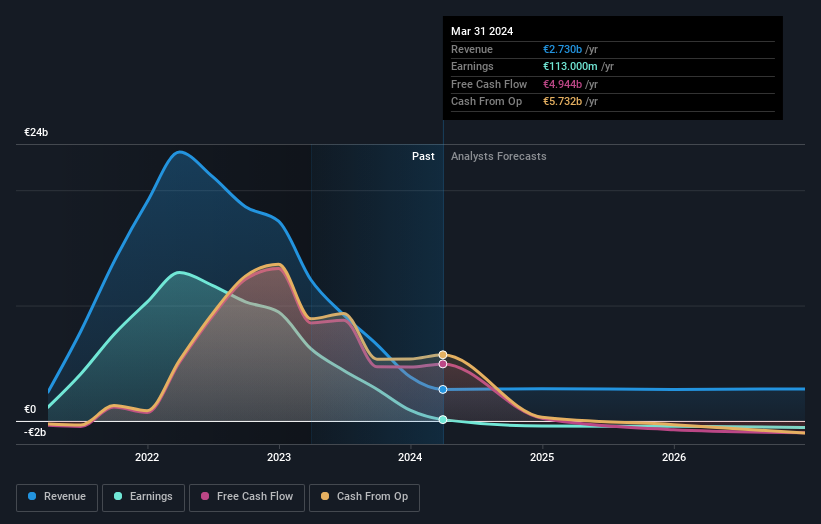- United States
- /
- Biotech
- /
- NasdaqGS:BNTX
Analyst Estimates: Here's What Brokers Think Of BioNTech SE (NASDAQ:BNTX) After Its First-Quarter Report

Investors in BioNTech SE (NASDAQ:BNTX) had a good week, as its shares rose 2.3% to close at US$90.88 following the release of its first-quarter results. Revenue was dismal, with revenues of €188m coming in some 50% below forecasts. The only bright spot was that statutory losses of €1.31 per share were 14% smaller than the analysts had predicted. This is an important time for investors, as they can track a company's performance in its report, look at what experts are forecasting for next year, and see if there has been any change to expectations for the business. We thought readers would find it interesting to see the analysts latest (statutory) post-earnings forecasts for next year.
View our latest analysis for BioNTech

Taking into account the latest results, the most recent consensus for BioNTech from 18 analysts is for revenues of €2.79b in 2024. If met, it would imply a modest 2.2% increase on its revenue over the past 12 months. Earnings are expected to tip over into lossmaking territory, with the analysts forecasting statutory losses of -€1.92 per share in 2024. Before this earnings announcement, the analysts had been modelling revenues of €2.80b and losses of €2.31 per share in 2024. Although the revenue estimates have not really changed BioNTech'sfuture looks a little different to the past, with a cut to the loss per share forecasts in particular.
The average price target held steady at US$115, seeming to indicate that business is performing in line with expectations. It could also be instructive to look at the range of analyst estimates, to evaluate how different the outlier opinions are from the mean. There are some variant perceptions on BioNTech, with the most bullish analyst valuing it at US$171 and the most bearish at US$89.25 per share. This is a fairly broad spread of estimates, suggesting that analysts are forecasting a wide range of possible outcomes for the business.
Of course, another way to look at these forecasts is to place them into context against the industry itself. It's pretty clear that there is an expectation that BioNTech's revenue growth will slow down substantially, with revenues to the end of 2024 expected to display 2.9% growth on an annualised basis. This is compared to a historical growth rate of 36% over the past five years. By way of comparison, the other companies in this industry with analyst coverage are forecast to grow their revenue at 18% per year. Factoring in the forecast slowdown in growth, it seems obvious that BioNTech is also expected to grow slower than other industry participants.
The Bottom Line
The most obvious conclusion is that the analysts made no changes to their forecasts for a loss next year. On the plus side, there were no major changes to revenue estimates; although forecasts imply they will perform worse than the wider industry. There was no real change to the consensus price target, suggesting that the intrinsic value of the business has not undergone any major changes with the latest estimates.
With that said, the long-term trajectory of the company's earnings is a lot more important than next year. We have estimates - from multiple BioNTech analysts - going out to 2026, and you can see them free on our platform here.
You should always think about risks though. Case in point, we've spotted 1 warning sign for BioNTech you should be aware of.
Valuation is complex, but we're here to simplify it.
Discover if BioNTech might be undervalued or overvalued with our detailed analysis, featuring fair value estimates, potential risks, dividends, insider trades, and its financial condition.
Access Free AnalysisHave feedback on this article? Concerned about the content? Get in touch with us directly. Alternatively, email editorial-team (at) simplywallst.com.
This article by Simply Wall St is general in nature. We provide commentary based on historical data and analyst forecasts only using an unbiased methodology and our articles are not intended to be financial advice. It does not constitute a recommendation to buy or sell any stock, and does not take account of your objectives, or your financial situation. We aim to bring you long-term focused analysis driven by fundamental data. Note that our analysis may not factor in the latest price-sensitive company announcements or qualitative material. Simply Wall St has no position in any stocks mentioned.
About NasdaqGS:BNTX
BioNTech
A biotechnology company, develops and commercializes immunotherapies for cancer and other infectious diseases.
Flawless balance sheet and overvalued.
Similar Companies
Market Insights
Community Narratives




